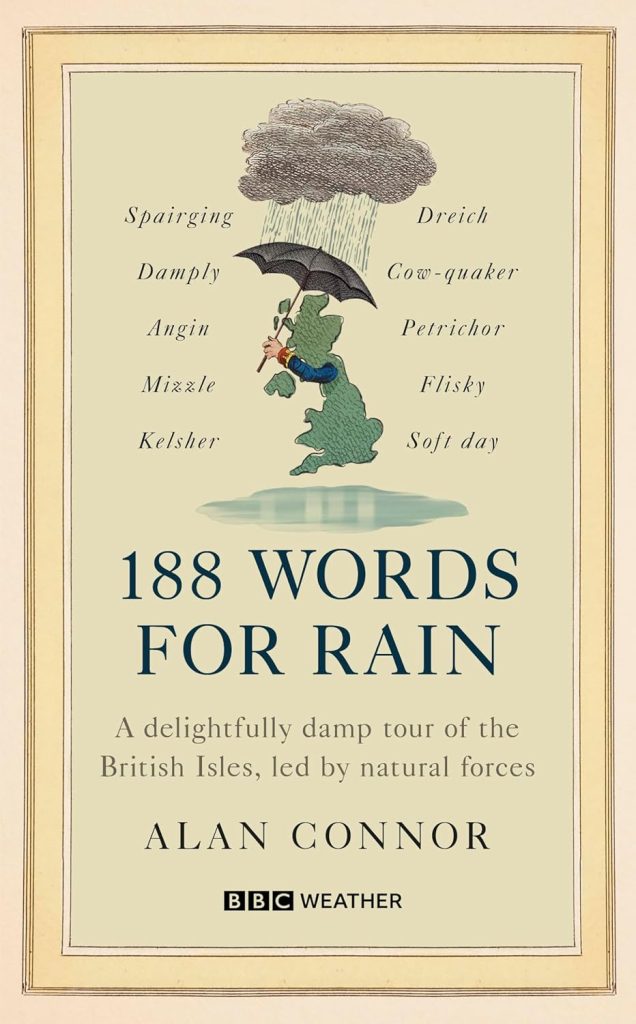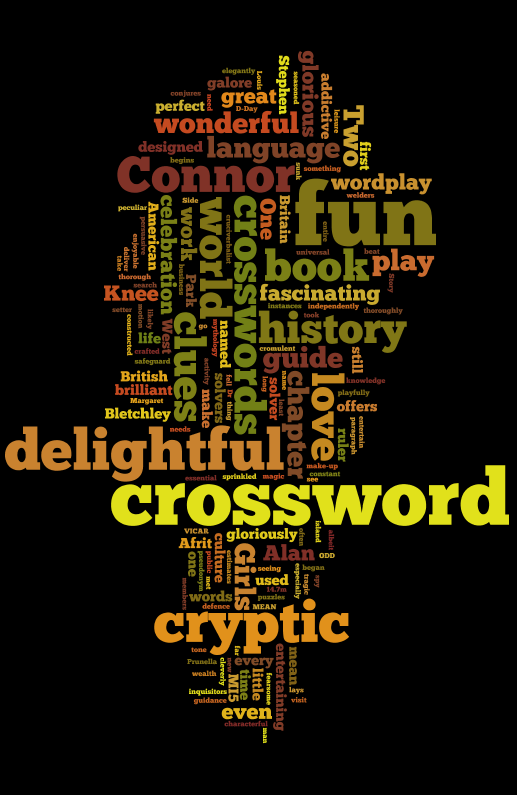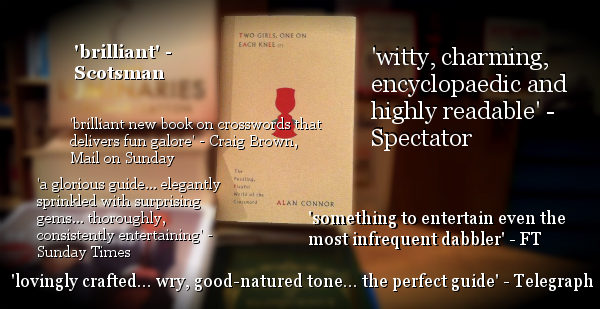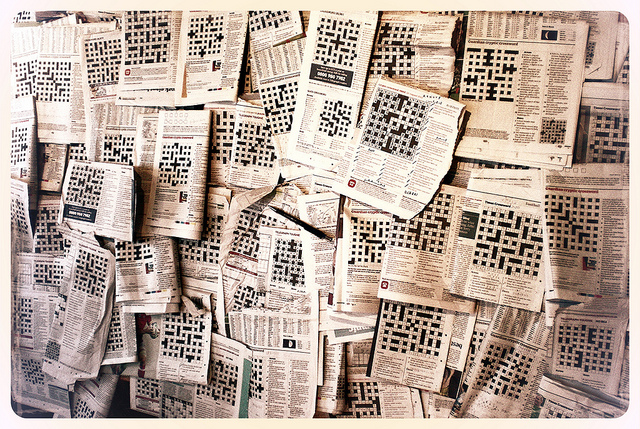Posts Tagged ‘language’
The Verb | BBC Radio 4
3 November, 2024Talking rain with Ian McMillan and pals. 188 Words for Rain published next week.
Ah, the joy of @R4TheVerb with @alanconnor @pascalepoet @DerynRJ @Isysuttie ! pic.twitter.com/qiNtmuV6w0
— Ian McMillan (@IMcMillan) October 24, 2024
188 Words for Rain | BBC Books
22 August, 2024‘
‘This delightful book … this lovely book’ – The Times
ORDER: Local bookshop | Amazon | Waterstones | more
Travel around these islands enjoying our many kinds of rain and the words we use for them.
‘Alan knows everything, knows everyone, and writes beautifully too.’ – Richard Osman
‘I’ve always been in awe of Alan Connor: the man with the contents of the Oxford English
Dictionary stored just above his left eyebrow … and he’s quite funny too.’ – Rory Cellan-Jones
‘A gorgeous, funny tour of the British Isles as seen from the clouds.’ – Konnie Huq
Goodreads | Librarything
BBC Books, 14 Nov 2024
ISBN: 9781785948541, 320 pages, £16.99
Trump, double-negatives and politics | BBC News
23 July, 2018A quick piece for the BBC about double negatives:
It’s hard to understate how often we find ourselves using two negatives when we don’t mean to – in fact, this sentence begins with a common example
See also:
Election Lexicon | BBC News
12 May, 2017By me for BBC News: Election Lexicon, the words which “caught the ear” in a week of campaigning.
27 May: [campaigning suspended]
The Crossword Century: 100 Years of Witty Wordplay, Ingenious Puzzles, and Linguistic Mischief for Gotham
3 July, 2014“Amusing and informative”
— Pultizer-winner Jonathan Yardley, Washington Post
“such a fun read”
— Dinesh Ramde, Washington Times
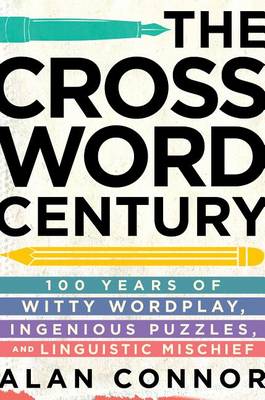 My book about the fun of crosswords, The Crossword Century: 100 Years of Witty Wordplay, Ingenious Puzzles, and Linguistic Mischief, has been published by Gotham.
My book about the fun of crosswords, The Crossword Century: 100 Years of Witty Wordplay, Ingenious Puzzles, and Linguistic Mischief, has been published by Gotham.
A couple of responses…
“Alan Connor’s Crossword Century is a fun and fascinating tale of language, commerce, culture and play. Before reading this book, I didn’t have a clue about the crossword’s checkered past. Now I can see its extraordinary future, too.”
— John Pollack, author of The Pun Also Rises and Shortcut: How Analogies Reveal Connections, Spark Innovation and Sell Your Greatest Ideas
“If you love language and history and marvel at the genius of puzzles, codes, and game design, Alan Connor’s deep dive into the crossword will keep you smiling and eagerly turning pages. Connor playfully explores the history of the beloved, gamified fever dream of sentences, definitions, letters, and words that is the modern crossword and reveals the dance that strange invention has enjoyed with its caretakers across history. If you adore words and wordplay, if you see language as an endless mutating jungle of puzzles and experimentation, you need this book in your life.”
— David McRaney, author of You Are Not so Smart and You Are Now Less Dumb
…some press…
- This Week’s Must-Read Books, New York Post
- The Crossword’s Meandering 100-Year Journey, MacLean’s
- Down, But Not Out: The Uncertain Future of the Crossword Puzzle, The Atlantic
…and the reviews of the British edition as a word cloud:
It is available at your local bookshop, or at IndieBound, Amazon, Barnes & Noble, Powell’s, Books-A-Million, The Book Depository, iTunes, and so on.
And… it contains a puzzle by Brendan Emmett Quigley.
Listen: Think, from KERA
[soundcloud url=”https://api.soundcloud.com/tracks/158253855″ params=”color=ff5500″ width=”100%” height=”166″ iframe=”true” /]
[soundcloud url=”https://api.soundcloud.com/tracks/159820726″ params=”auto_play=false&hide_related=false&show_comments=true&show_user=true&show_reposts=false&visual=true” width=”100%” height=”166″ iframe=”true” /]
- Buy or read more about the UK edition
- Up to Date, KCUR · The Book Report · Lincoln Live, KFOR · Craig Fahle Show, WDET · Life Elsewhere, WMNF · Martin Kilcoyne Show, KTRS · Dean & Don, KMA-FM · Central Time, Wisconsin Public Radio
- Word cloud from Wordle
- Health & Self-Improvement Staff Picks, Penguin USA Blog
A Talk at the York Festival of Ideas
16 June, 2014I’m giving a talk about crosswords at the York Festival of Ideas:
- Wednesday 18 June 2014
- 6.00pm to 7.00pm
- Berrick Saul Building, University of York
- Booking through Eventbrite
Update 20 June: Thank you to everyone at the festival and the university. The slides are here:
- Image of a Tour de France bicycle in York
Two Girls, One on Each Knee: The Puzzling, Playful World of the Crossword | Penguin
5 June, 2014My book about crosswords, Two Girls, One on Each Knee, is out today as a paperback.
It costs no more than £8.99, and I have removed an error, one concerning the PG Wodehouse story with the strawberries. It now begins with some commendations:
‘Connor’s wry, good-natured tone and his commitment to the serious business of play make him the perfect guide to a great pastime’ John Gallagher, Telegraph
‘Alan Connor’s charming, fascinating history of how the crossword went from a space filler in the back section of an American newspaper to one of the world’s most ubiquitous and addictive habits – he estimates that in Britain some 14.7m people do a crossword at least once a week – is the guide you have been waiting for. In a single, gloriously decipherable chapter he lays out with perfect clarity the entire range of rules and devices through which cryptic clues work their magic’ Robert Collins, Sunday Times
‘Connor’s scholarly knowledge doesn’t stop him extolling the vocabulary of The Simpsons. The solution to the title, by the way, is ‘patella’.’ Ben Felsenburg, Metro

‘No crossword addict, be they a compiler or a solver, can ignore it‘ Alan Taylor, Herald
‘Connor’s book is cleverly constructed around an initial cryptic crossword in which each clue provides the title of a chapter. And each chapter can be read independently of the others. There is something to entertain even the most infrequent dabbler, from a primer on how to actually do a cryptic crossword to the puzzle’s famous fans – the Queen, Sepp Blatter and Frank Sinatra among them – and its connections with the trains (one line in the US used to carry dictionaries)’ Carl Wilkinson, Financial Times
‘The brilliant new book on crosswords . . . Â Delivers fun galore whether you’re a doer or a duffer . . . Two Girls, One on Each Knee consists of a series of short, sparky chapters on topics as various as ‘Crosswords and detective fiction’, ‘Can machines do crosswords?’ and ‘The many ways of being rude in a crossword’. . . And this is also the guiding principle of his book — it favours the byway over the highway, and can never say no to a red herring’ Craig Brown, Mail on Sunday
‘This book shows you, among other things, how speaking aloud unpromising phrases such as ‘Tooting Carmen’ and ‘Servants Tease’ can yield obvious answers, and how sociable the crossword is. Of course, it can be tackled alone, and in Brief Encounter, it represents the antithesis of the longed-for romance, but it’s also perhaps fun to tackle with two or more heads rather than one’ Michael Caines, The Times Literary Supplement

‘Connor writes with great flair . . . it is nice to dip in and out of his entertaining essays’ Don Manley, Church Times
‘It is the relationship between setter and solver, between words and fun which provides the narrative thrust for Two Girls, One on Each Knee … ‘The experience of reading this book’, Connor says in the preamble, ‘should be equivalent to that of solving a cryptic puzzle…’ In fact it is rather better; it does not demand as much of the reader as a good puzzle does of the solver, but it delivers far more of its own accord. It is witty, charming, encyclopaedic and highly readable – and it can be read in any order. Take a chapter or a paragraph, a puzzle or a clue. In each the reader will find something to intrigue and delight‘ Sandy Balfour, Spectator

‘A wonderful little book that looks at the fascinating, often baffling world of the cryptic crossword. What connects Bletchley Park and the Daily Telegraph? And why should you always start in the bottom right-hand corner? Most of all, it’s a celebration of language‘ Jon Stock, Daily Telegraph
‘Delightful . . .
Verdict: Top rating for odd number of celebrities (4,5)’ Brandon Robshaw, Independent on Sunday
‘A joyous paean to the history of puzzlement and an essential guide‘ PD Smith, The Guardian
‘Delightful celebration of crosswords’ The Observer
‘A glorious guide that explains the history and universal appeal of the crossword’ Sunday Times, 100 Best Books for the Beach
You can buy it from your local bookshop, or from Penguin, Waterstones, Amazon, on Kindle, via Google etc…
- Another Penguin: The Joy of Quiz
Two Girls, One on Each Knee (7): The Puzzling, Playful World of the Crossword
7 November, 2013My book to mark the centenary of the crossword is published today by Penguin. Here it is…
…in Kew Bookshop.
Reviews, etc: Sunday Times; Mail on Sunday; Spectator; Telegraph; Scotsman; Financial Times; Metro; Times; Herald; Globe & Mail.
Hear me: on The Verb and on Weekend.
From the blurb:
• How have crosswords helped international relations, caused a strike by welders, become embroiled with espionage and even caused a moral panic?
• What have Frank Sinatra, P. G. Wodehouse and Stephen Sondheim got to do with the humble grid?
• What connects Bletchley Park and the Daily Telegraph?
• Which famous fan starts each day with the Telegraph crossword and kippers?
On 21 December 2013, the crossword puzzle will be 100 years old. In the century since its birth, it has evolved into the world’s most popular intellectual pastime. In Two Girls, One on Each Knee, Alan Connor celebrates the wit, ingenuity and frustration of this addictive sport and how it has grown.
The story of the crossword takes us from the beaches of D-Day to the banks of the river Neva, via Fleet Street and the Old Bailey. It involves the most fiendish setters, such as Torquemada and Ximenes; famous fans (both real and imaginary) from P. G. Wodehouse to Frank Sinatra, Inspector Morse to Reggie Perrin. You’ll discover how crosswords have featured in films such as Brief Encounter and songs by Madness and Ian Dury; how they intersect with espionage, jokes, class and morality; and how they reflect back how our language and behaviour has changed over the last century. You’ll also discover how listening to white noise can help you do a crossword, why you should start in the bottom right-hand corner, and why cryptic crosswords are actually easier than quick (honestly).
This is a book about language and how it speaks to itself, twisting and transforming through cryptic clues before resolving itself, with a bit of luck, into an answer. Where else would you find words such as Intussuscept, Obtemperate, Zibet and Raisiny?
You can buy it from your local bookshop, or from Penguin, Waterstones, Amazon, on Kindle, via Google etc…
Two Girls, One On Each Knee: A Crossword Book for Penguin
3 June, 2013My book about the crossword, Two Girls, One On Each Knee (7), has a publication date of 7 November 2013.
Twittiquette – or Twemes among Tweeple who Tweetup for Twirting and/or Twisticuffs
5 September, 2011I’ve written a piece for the BBC about words beginning with “tw-“, and why people enjoy coining them on Twitter.
“Flick through a dictionary and you’ll notice something about the English language’s ‘tw’ words. We have a few related to ‘two’: twin, twelfth, twilight and so on. And there’s a tiny minority of what you might call fairly sensible words: tweezers, twig and of course tweed.
“The rest, though, tend to be of a type that’s more playful or, depending on taste, more grating. ‘Tw-‘ words can be about inanity or ignorance: twit, twerp, twonk or twaddle. They can suggest lightness, smallness or delicacy: tweak, twiddle or twinkle. Or they can flag up that you’re being self-consciously old-fashioned: ’twas and ’twere; ‘twixt and ‘tween. All very twee.”
Sadly there was no room for the etymology of “twonk” – coined/popularised, according to the Telegraph, by John Sullivan to give Del Boy a non-sweary swear word; nor for gay slang “twink” (“with a slender build, little or no body hair, and no facial hair”).
Also, now that we know that “twilight” relates to “two”, why not let’s enjoy some twilights I’ve seen?
- More on exciting/annoying new words in my piece on Nudge, Blink, the Magnetic Middle &c.
- Props to Michael Rosen, Sadanand Dhume and languagehat.
The Guardian Crossword Blog
18 August, 2011I’ve started a blog about the fun of doing cryptic crosswords at the Guardian. The first post is now live:
“Others suggest [that] those of us hooked on crosswords might want to justify the time passed by pointing to the large vocabulary we’ve amassed – or, perhaps, to our pleonasm, to our Brobdingnagian prolixity. Well, boo-poo to that. (I admit I enjoyed learning the word ‘pleach’ from last Tuesday’s Times, but it may be many years until I get to use it in a sentence near a hedge.)”
It’ll be a mixture of the week’s best and funniest clues, tips for n00bs and features on awesome stuff like when crosswords feature in programmes like Rubicon and The Hour.
- Topics [ongoing update]: Bletchley Park; Is cheating cheating?; The Ten Commandments of cryptic ethics; Which newspaper is most crossword-friendly?; American vs British crosswords; Where do you solve?;Â Times Crossword Championship;Â Meet Anne R Bradford; the 1920s crossword moral panic; what I’ve learned from cryptics
- Meet the Setter [ditto]: Paul; Enigmatist; Anax; Tramp; Boatman
- For beginners [ditto]: Hidden answers; double definitions; soundalikes
- What does each letter mean? [ditto]: A
- Best clues [ditto]: Meta, Morse and Arsenal; Lord Sugar, Rupert Murdoch and the flesh lance; gamesmanship, ice cream and haiku; Elton John, hidden Damons and Moses; Smiley and Nixon; Ed Balls, Ed Miliband and David Cameron; Blur v Oasis; chess and the Tube; booze clues; e-ologisms; should themes be announced?; loos in clues; the ‘scrambled eggs’ chestnut; Occupy London Stock Exchange; new words in Chambers; Romeo and Juliet and Ant and Dec; booze and Dylan Thomas; ErdÅ‘s-Bacon numbers; Yule clues; cryptic Dickens
- Photo is of Guardian 25,402 by Puck. The only answer I’ve put in is wrong. “A day in dopey stupor, endlessly like t-h-i-s? (6,3)” should give SPACED OUT, not SPREAD OUT as I thought. This bodes ill.
- In 2009, I explained to foreigners why some British families do a jumbo crossword at Christmas.
